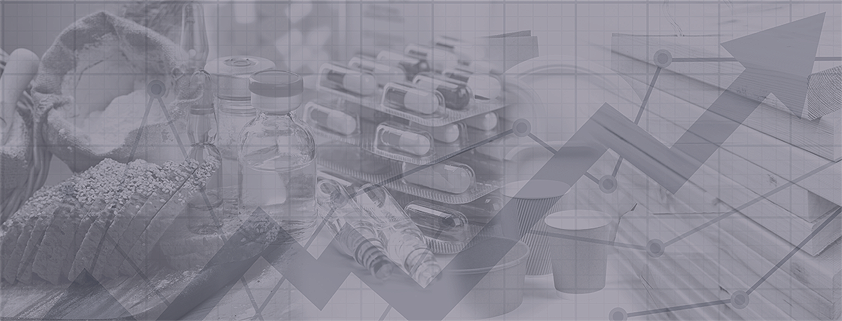
Strong outlook
2020 was a trying year for most sectors, with the UK economy estimated to have shrunk by c.11 per cent. UK manufacturing shared the pain, with output down ten per cent through three quarters. However, within manufacturing the impact was asymmetric. Automotive and aerospace had very difficult years, with travel shutdowns cancelling or delaying plane orders and Brexit-driven uncertainty over international supply chains and UK automotive output dropping by 30 per cent due to a mix of supply chain pressures, manufacturing restrictions and consumer confidence.
On the flipside, several manufacturing sectors actually grew, and many more weathered the storm far better than initially expected. More exciting is the fact that outlook within these sectors for a strong 2021 is positive, with PMI indices reflecting a good climate for investment both within and into UK manufacturing.
Beverages & food manufacturing
The UK’s largest manufacturing sector had a lot to deal with in 2020. People’s eating habits changed rapidly as lockdowns spread and panic buying put significant pressure on supply chains, with foods such as eggs, flour and bread flying off shelves. The accelerated move to online groceries put enormous pressure on both third party and owned distribution platforms. This was set against a backdrop of potential supply issues on goods imported from the EU (both food and ingredients). Despite this, grocery sales grew and while this was partly driven by the temporary halt of restaurants, coffee shops and food-to-go, the industry is forecast to continue to benefit from changed habits in 2021, while many of the pressures should abate. Kantar’s most recent forecast is that grocery sales will have risen by ten per cent from the start of 2020 to the end of next year.
Chemicals & pharmaceuticals
This is the UK’s second biggest area of manufacturing. Despite headwinds in the petrochemicals market with reduced demand for hydrocarbons, the overall sector weathered the market fluctuations well in 2020 and is well placed for a strong 2021. As well as the record-breaking accelerated production of global vaccines within the pharmaceutical space, chemicals going into industrial and commercial cleaning, battery technology and plastics recycling all performed very well and, together with chemicals going into areas such as construction, are set to do well in 2021. In addition, the striking of a zero-tariff Brexit deal for most chemical products has removed a lot of background uncertainty, although delays at ports will still impact the sector in the short term.
Household products
Strong demand for surface cleaning products, washing powders, washing-up liquids and personal & feminine hygiene products ensured 2020 was a good year for household products, as reflected in the results of the major household goods manufacturers, including the UK’s Reckitt Benckiser. With supply chain pressures expected to ease in 2021 and a general sentiment that enhanced cleaning regimes will remain in place despite the vaccine, at least within commercial environments, 2021 appears to promise another strong performance.
Packaging
2020 was a highly disruptive year for this normally stable sector. Covid-19 saw a significant impact on food-to-go sales, although when cafés were open the recent rise in reusable cups went into reverse. Greater focus on hygiene has presented many opportunities for manufacturers, however, and slowed moves to reduce packaging content (albeit only temporarily). Positive trends include the growth in grocery sales and the growth in ecommerce, with consumers very focused on the condition and shelf-life of what they buy and on-packet branding becoming even more important to the relationship with the end customer.
Building products
The recent Brexit deal has given builders much more clarity on the cost and availability of imported materials such as timber and roofing materials. Loss of skilled labor with the exit from the EU and ongoing delays at UK ports will continue to cause some frustration, but UK housebuilders held up far better than initially expected through 2020. Construction is widely recognized as one of the major industries to contribute towards rebuilding the economy. Indeed, according to
recent construction PMI data, only ten per cent of companies in the sector felt it would contract in 2021, versus 50 per cent believing it would grow.
Overall
There are also several other manufacturing sectors, such as capital goods that are set to return from a more difficult year, with deferred business investment from 2020 deployed over the next couple of periods. It will take longer for Automotive and Aerospace to recover, but in the longer-term, population growth, the reopening of the travel sector and legislation-related advances in automotive technology should all contribute to the overall outlook beyond 2021.
The FTSE 350 Industrials index is currently 40 per cent above its March 2020 low, while PMI data reflects confidence within the sector. 2021 will be a vintage year for manufacturing investment both within businesses and through M&A.
Graham Carberry
Graham Carberry is Managing Director at Arrowpoint Advisory, the dedicated lower mid-market team of Rothschild & Co in the UK. We provide expert M&A, Debt and Special Situations advice to publicly-listed, private and family companies, entrepreneurs, sponsor-backed businesses and management teams, investors and lenders.
arrowpointadvisory.com